
How To Delete iCloud Account Remove Your Apple ID Permanently On Apple iPhone SE

How To Delete iCloud Account: Remove Your Apple ID Permanently On Apple iPhone SE
Searching “How to delete iCloud account?” If you want to delete an iCloud account, you must delete an Apple ID account. And before you take this irreversible step, it’s crucial to understand the implications. Deleting your Apple ID account means permanently erasing all contents stored in your iCloud, such as media and documents. You’ll also lose access to essential Apple services such as the App Store, iMessage, and iTunes.
Deleting your Apple ID is a significant decision that should not be taken lightly. Proceeding with Apple ID deletion is a final decision. Once initiated, there’s no turning back. If you’re certain about it, refer to this article for a step-by-step guide on how to delete iCloud account and explore alternative options if you need it.

Part 1: Deleting iCloud Account? Essential Preparations Before You Proceed
Before you learn the steps on “how to delete icloud account,” take steps to ensure a smooth transition and prevent the loss of valuable data. Before you permanently remove an iCloud account, ensure you’ve completed the following:
Backup Your Data
Create a local copy of your files, photos, videos, and documents on your computer or an external hard drive. You can use cloud storage services or third-party apps like Wondershare Dr.Fone to selectively restore it later.
Request a Copy of Your Data
Apple provides a service on selected regions that allows you to request a copy of data associated with your Apple ID before deleting your account. It includes records of your sign-in, account details, iCloud contents, and Apple retail store transactions. Having a copy of this data can be useful if you need to access it in the future.
To request a copy of your data, go to Privacy Apple on your web browser. Under the Obtain a copy of your data section, click Request a copy of your data. Next, select the data you need and click Continue.
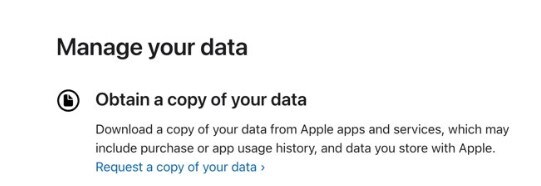
Review Your Active Subscriptions
Also, to “delete iCloud account,” first review any active subscriptions you may have, such as Apple Music, Apple TV+, or iCloud+ storage. If you don’t want to continue these subscriptions, cancel them before deleting your account.
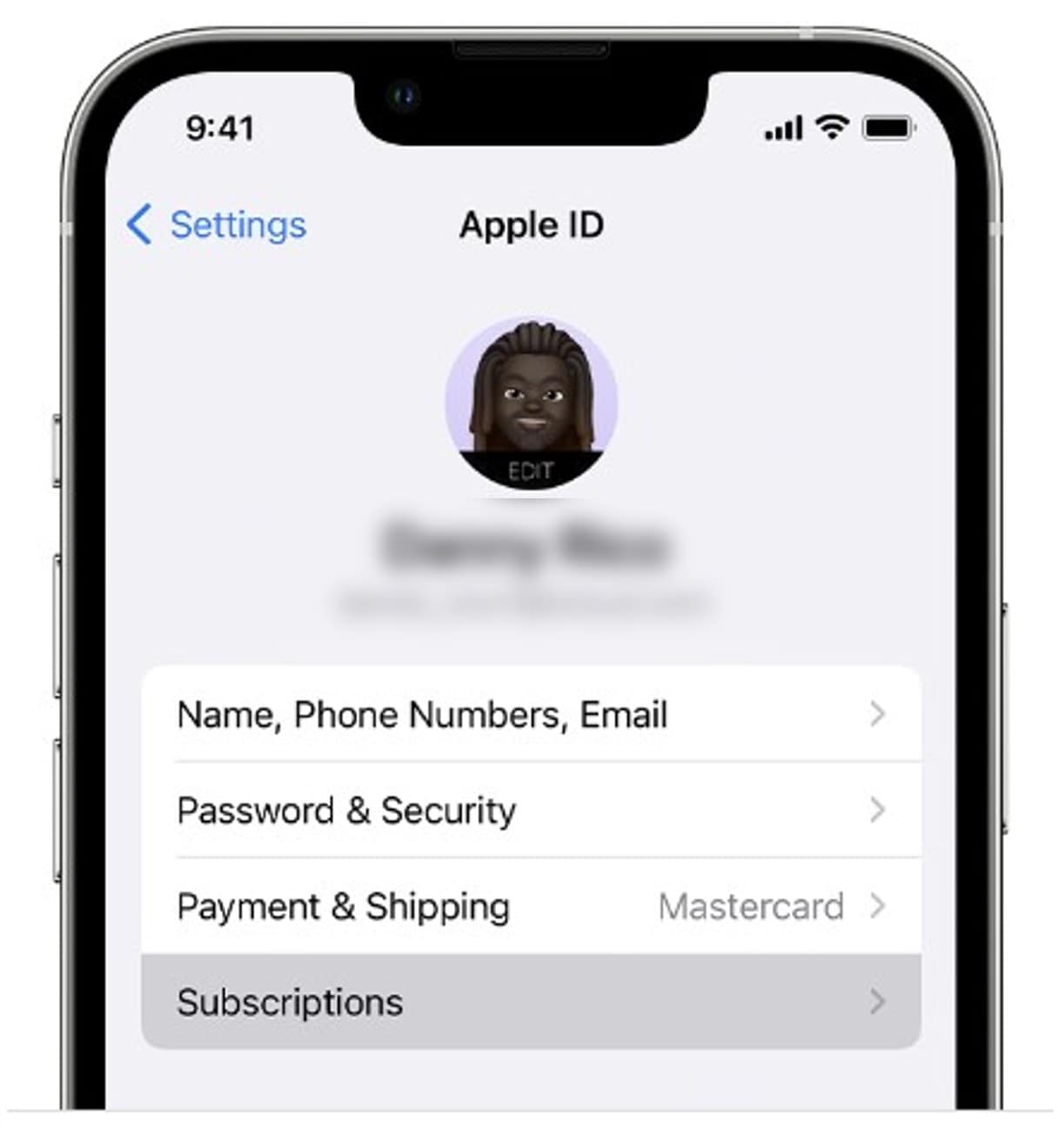
Download Backups of Your Apps, Games, Music, Movies, TV Shows, Books, and Audiobooks
Your iCloud account may contain backups of your apps, games, and media purchases. Before deleting your Apple ID account, download them to your device or a computer to ensure you don’t lose access to your favorite content.
Pay Loan Installments You Have With Apple Pay Later
If you have an outstanding loan with Apple Pay Later, pay off any remaining installments before you delete your iCloud account. Otherwise, you may incur late fees or other penalties.
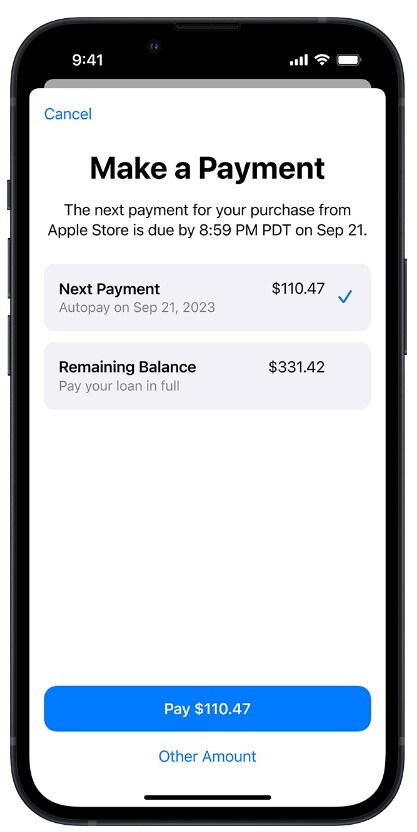
Sign Out of Your Devices and Web Browser
Before deleting your iCloud account, ensure you sign out of your account on all devices, including iPhones, iPads, Macs, and web browsers. Failure to sign out of an account can lead to several potential risks and inconveniences, including:
- Restricted device access
- App malfunctioning
- Constant Sign-in errors
- Web browsers retain your Apple ID information
Part 2: Remove iCloud Account Without Deleting: Maintaining Your Apple ID
Removing an iCloud account from your device doesn’t necessarily mean deleting the account itself. It simply means signing out of your iCloud account on that device. Your iCloud data remains intact and accessible from other devices.
However, when you sign out of iCloud on your device, you will be signed out of all Apple services that use your iCloud account. It includes Apple Pay, Find My, iCloud Mail, Siri Shortcuts, and others. You need to sign in with your Apple ID to use these services again.
Remove iCloud Account on iPhone
Here’s “how to remove iCloud account“ from your Apple iPhone SE without deleting the account:
- Step 1: Open the Settings app, then tap the Apple ID at the top of the Apple iPhone SE screen.
- Step 2: Scroll down, tap on Sign Out, enter your Apple ID password, and tap on Turn Off.
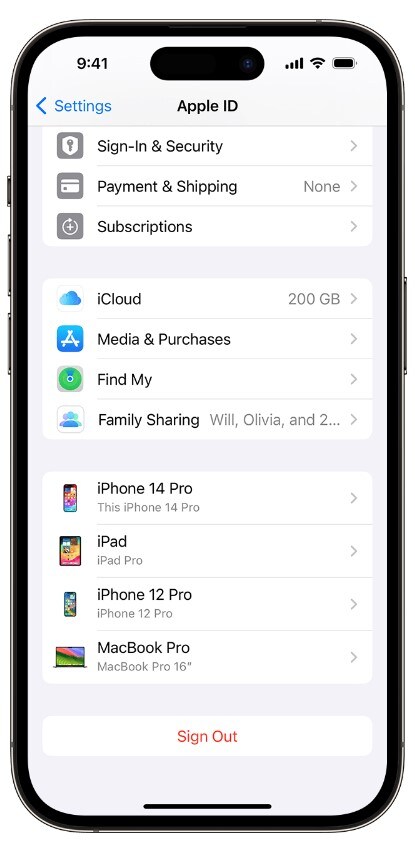
- Step 3: Tap on Sign Out to verify.
Remove iCloud Account on Mac Device
Follow these steps below to remove an iCloud account from your macOS Ventura or later:
- Step 1: Click on the Apple logo in the top left corner of your screen, then choose System Settings.
- Step 2: Click on the Apple ID icon and click Sign Out.
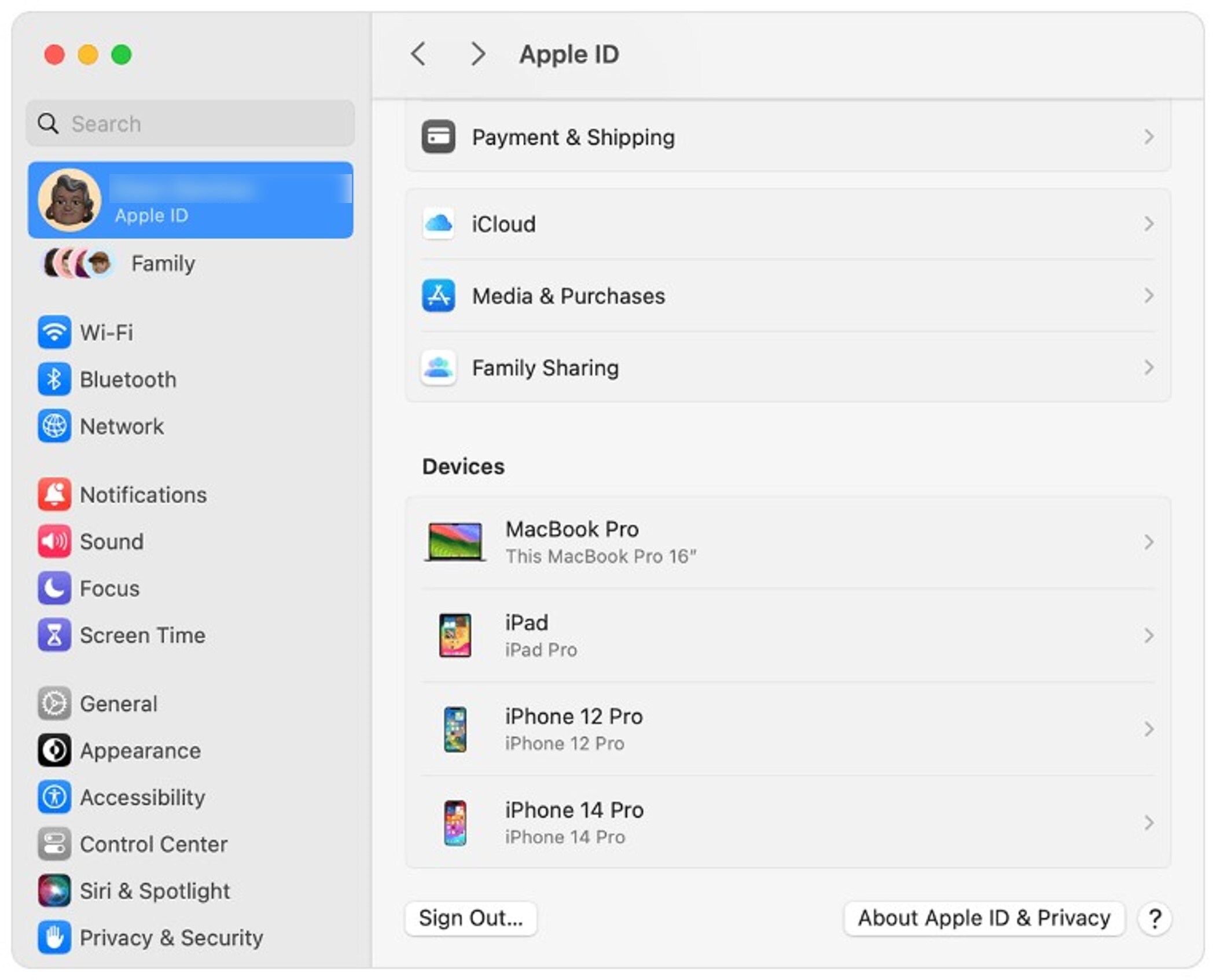
- Step 3: Select the data files you want to save, then click Keep a Copy.
Part 3: How To Delete iCloud Account Permanently?
Deleting your Apple ID has effects beyond the loss of data and services. These include:
- Apple will not be able to recover your Apple ID or any associated data once deleted.
- After deleting your iCloud account, any messages sent to you via iCloud Mail or iMessage will not be delivered.
- If you have any unused credit balance in your iCloud account, you cannot redeem or refund it upon deletion.
- The email address associated with your deleted Apple ID becomes unavailable for creating a new Apple ID.
If you are sure of your decision and have prepared for the consequences, here’s how to permanently delete your iCloud account:
- Step 1: Open a web browser and visit Apple’s privacy website: privacy.apple.com. Sign in using the Apple ID associated with the iCloud account you want to delete.
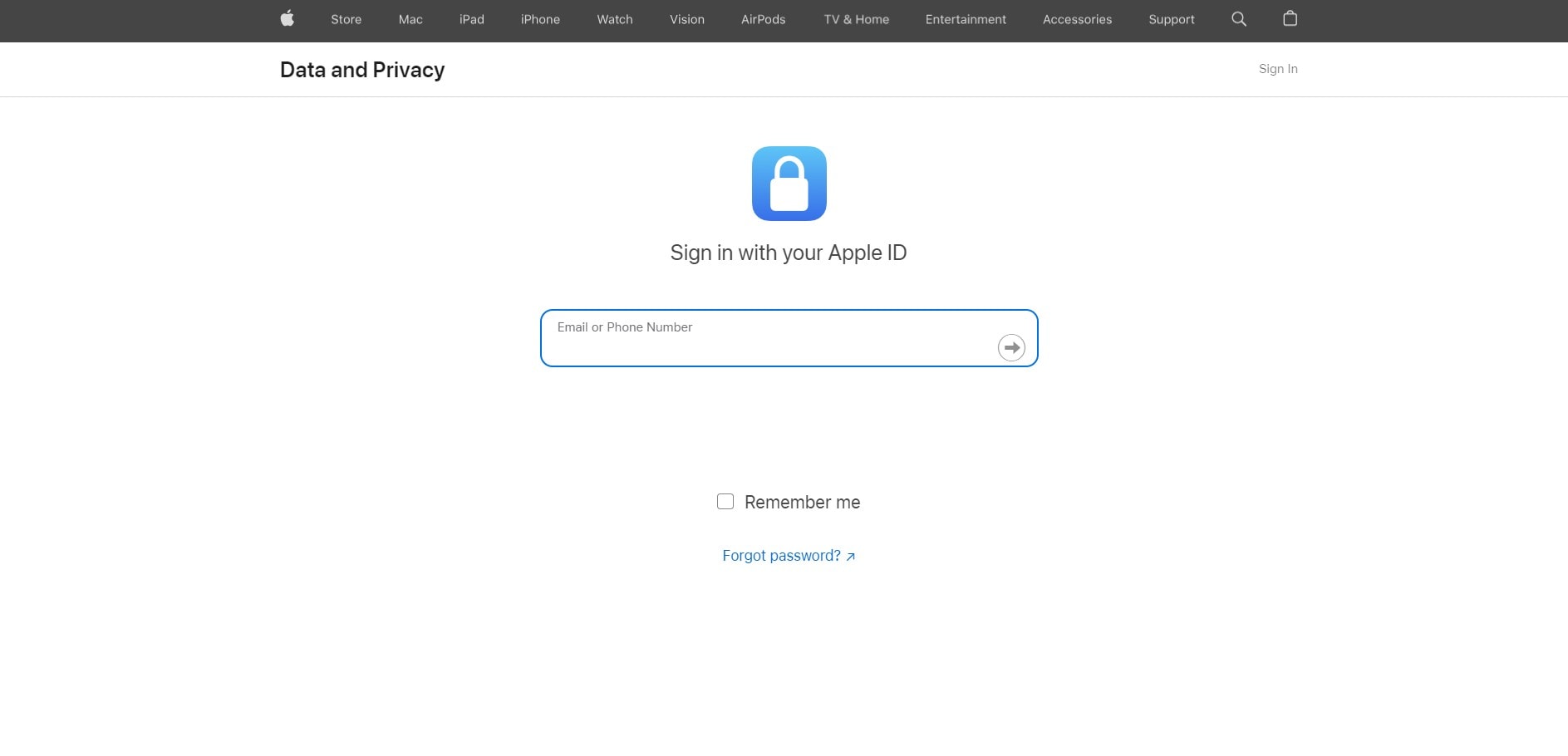
- Step 2: From Delete your account section, click Request to delete your account.
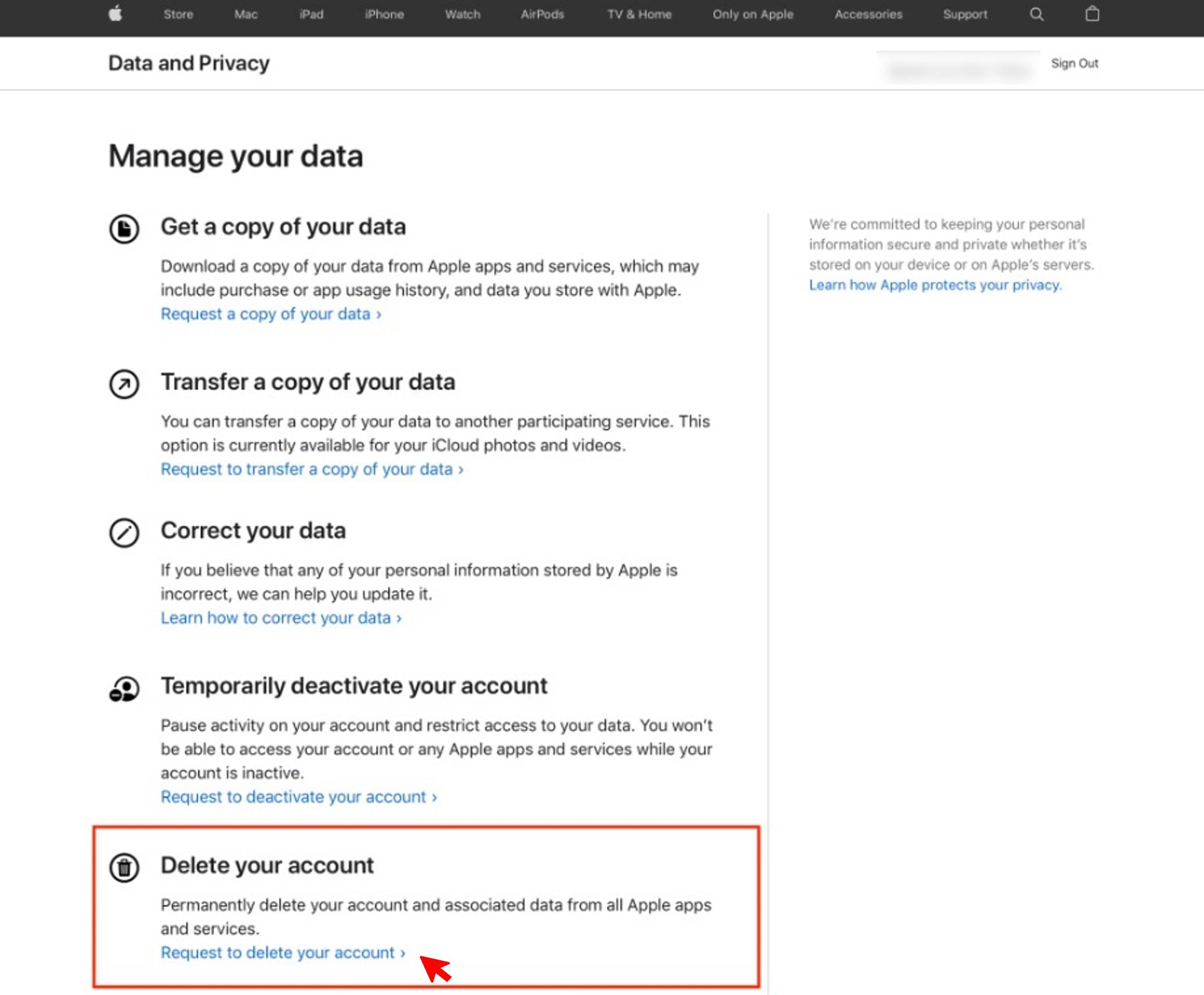
- Step 3: Choose a reason from the provided options in the drop-down menu for deleting your iCloud account, then click Continue.
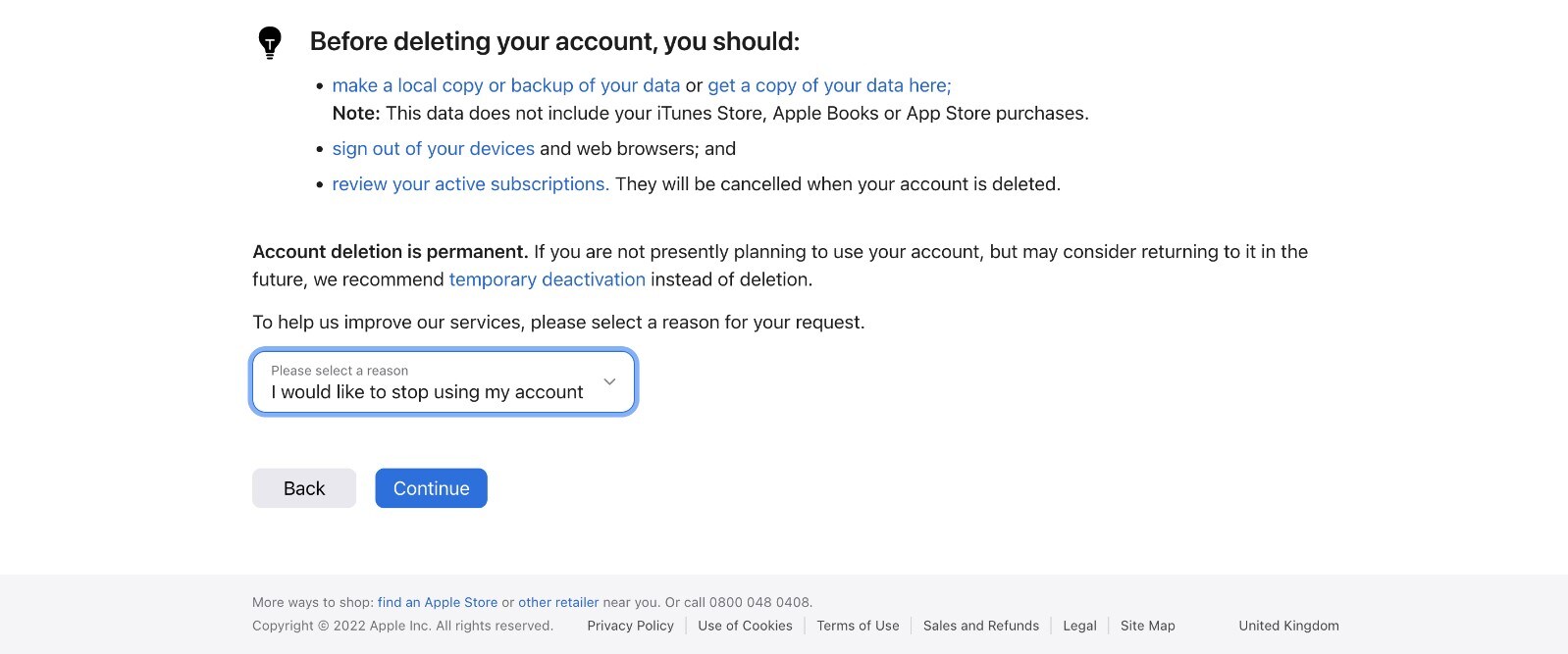
- Step 4: Review the information displayed, ensuring you want to proceed with deleting your iCloud account. Click Continue.
- Step 5: Choose where Apple can send you updates regarding your deletion request. Click Continue.
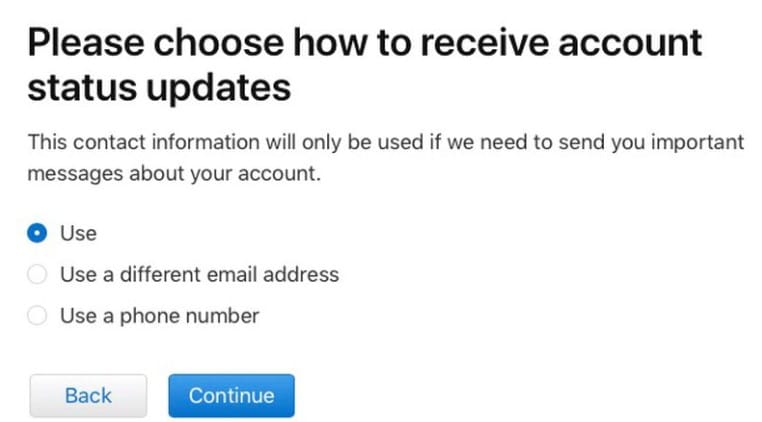
- Step 6: Follow the instructions provided to verify your identity. It may involve entering a code sent to your trusted device or answering security questions.
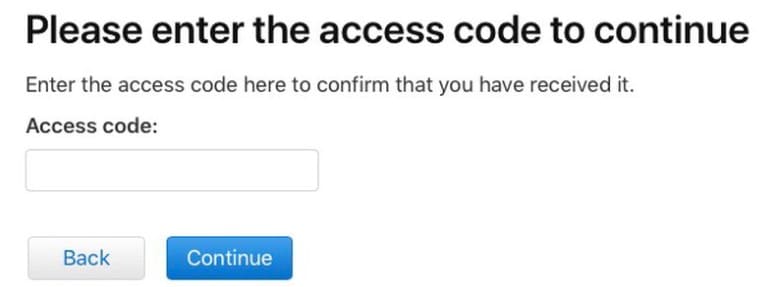
- Step 7: Review the summary of your deletion request, ensuring all details are accurate. Next, click Delete Account to finalize the deletion process.
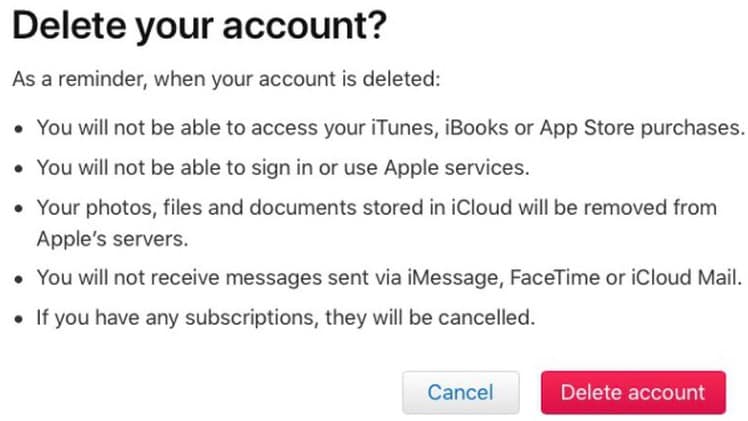
Part 4: How To Remove an iCloud Account Without a Password?
You’re not alone if you’ve forgotten your Apple ID password or bought a used iPhone with the previous owner’s Apple ID still on it. Many people find themselves in this situation, and it can be frustrating not being able to remove the iCloud account without the password. Fortunately, there is a way to do this using Dr. Fone’s iOS Screen Unlock tool:
- Compatible with all versions of iOS, including the latest iOS 17.
- Unlock different iPhone locks, such as screen locks and SIM locks.
- Bypass iCloud Activation lock
- Remove Apple ID even if the iOS device has enabled Find My service
Here’s a step-by-step guide on how to use Dr.Fone to remove an iCloud account without a password:
Step 1: Download and install Dr.Fone on your desktop.
Step 2: Launch the software and go to My Device. Follow the in-app instructions to connect your Apple iPhone SE to your computer using a USB cable.
Image name: how-to-delete-icloud-account-13.png
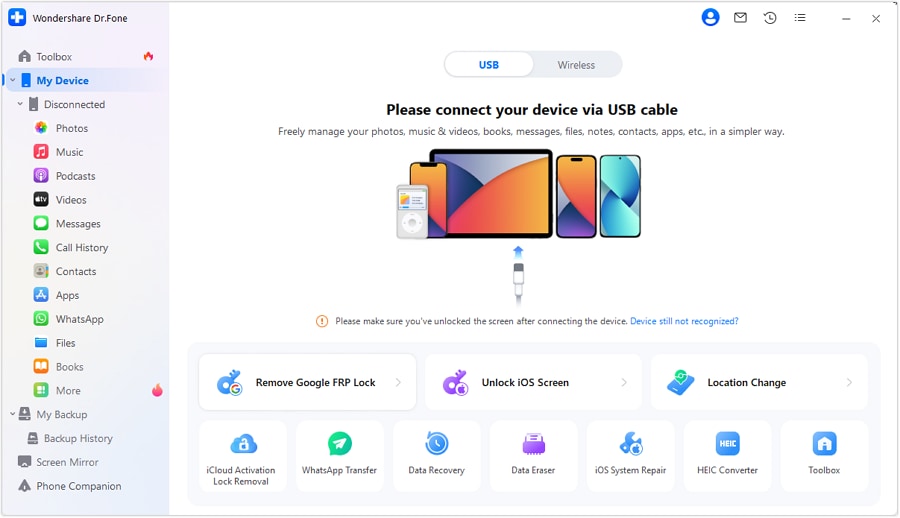
- Step 3: Go to Toolbox from the left navigation pane and select Screen Unlock > iOS.

- Step 4: Select Remove AppleID on the next window.
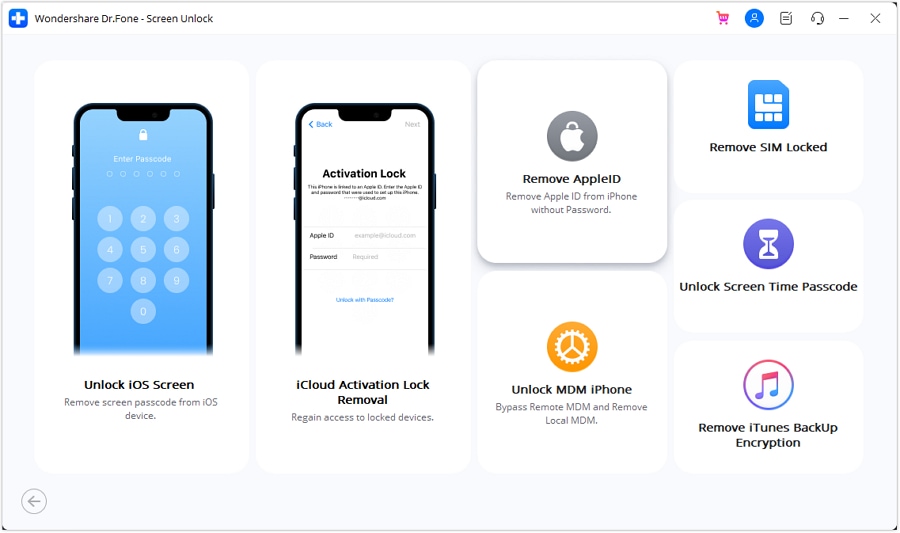
- Step 5: Click Unlock Now to proceed.
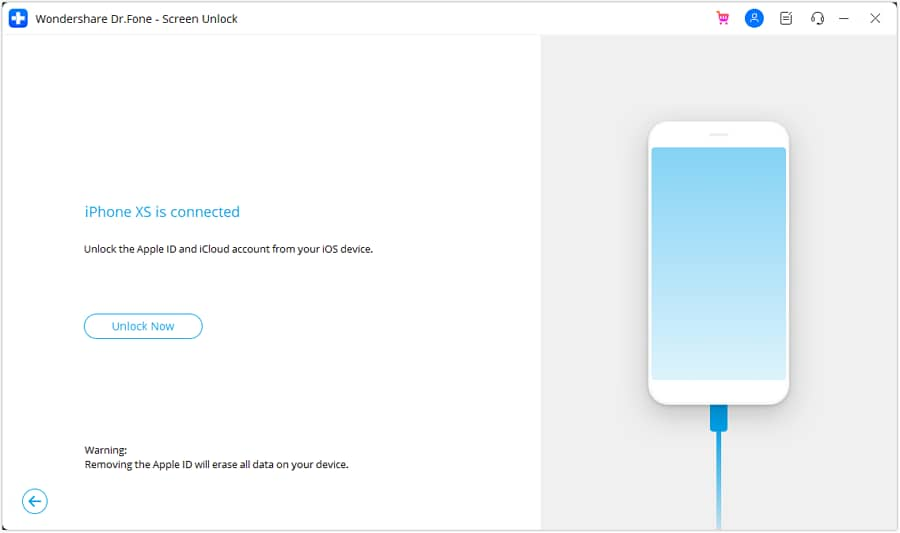
Note:
If you continue to “remove iCloud account“, this will erase all data from your Apple iPhone SE.
- Step 6: Click Yes if you have set up a screen lock.
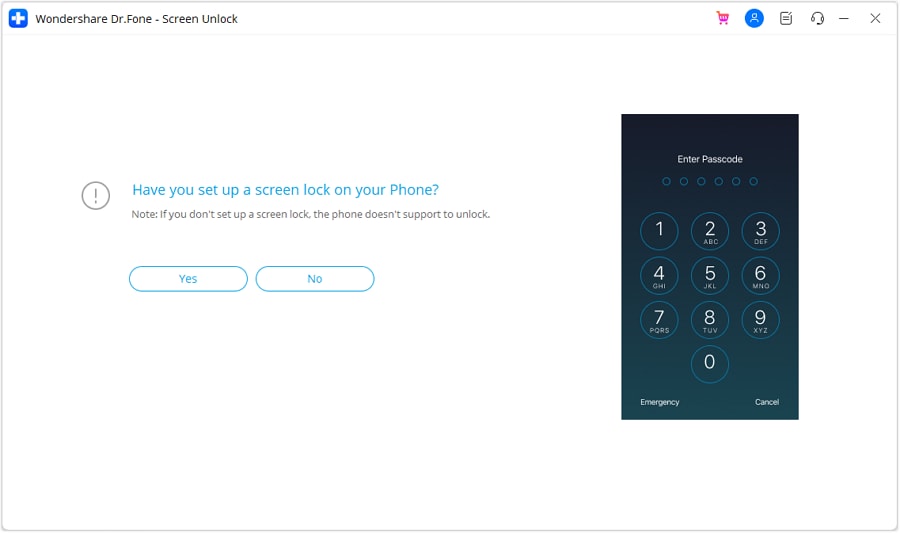
- Step 7: Click Yes if you have already enabled Two-Factor Authentication on your Apple iPhone SE.
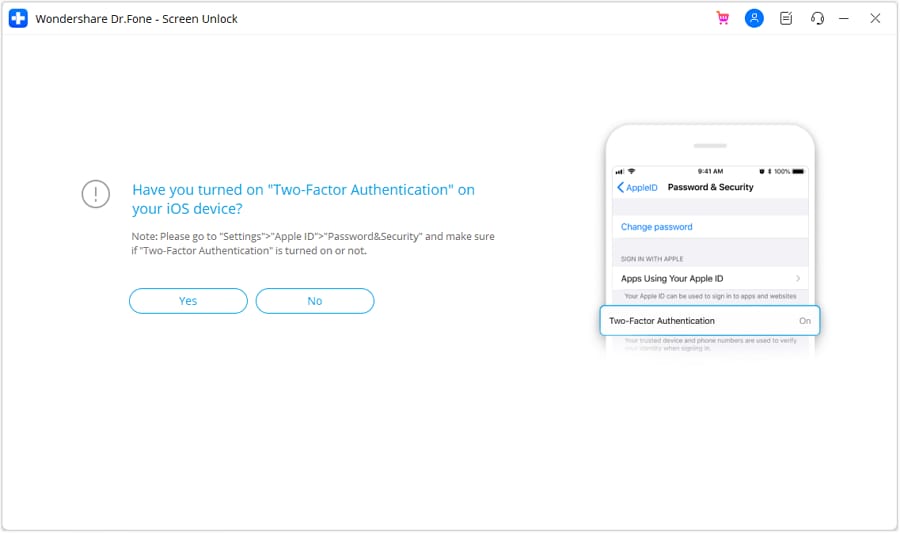
- Step 8: Follow the on-screen instructions to put your device into Recovery Mode.
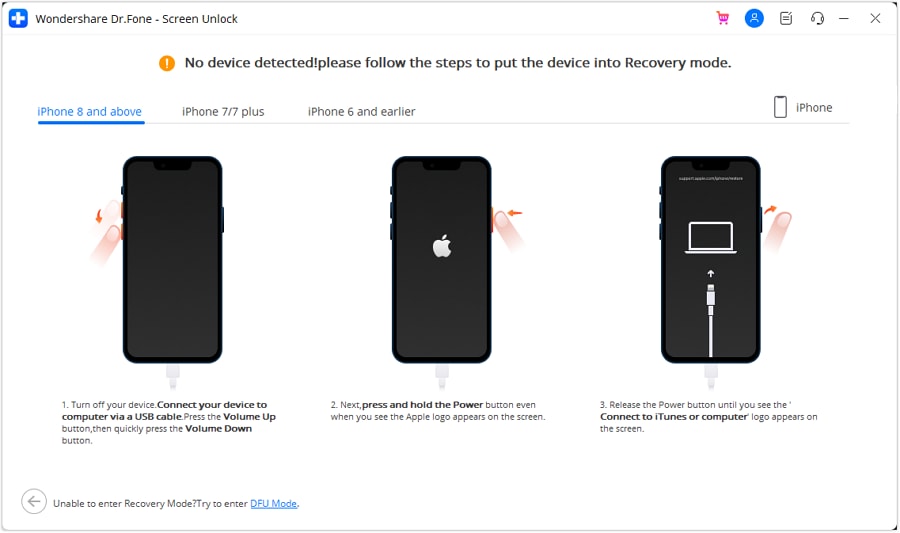
- Step 9: Dr.Fone will recognize your device in the Device Model. Choose an option from the System Version drop-down list and click Start.
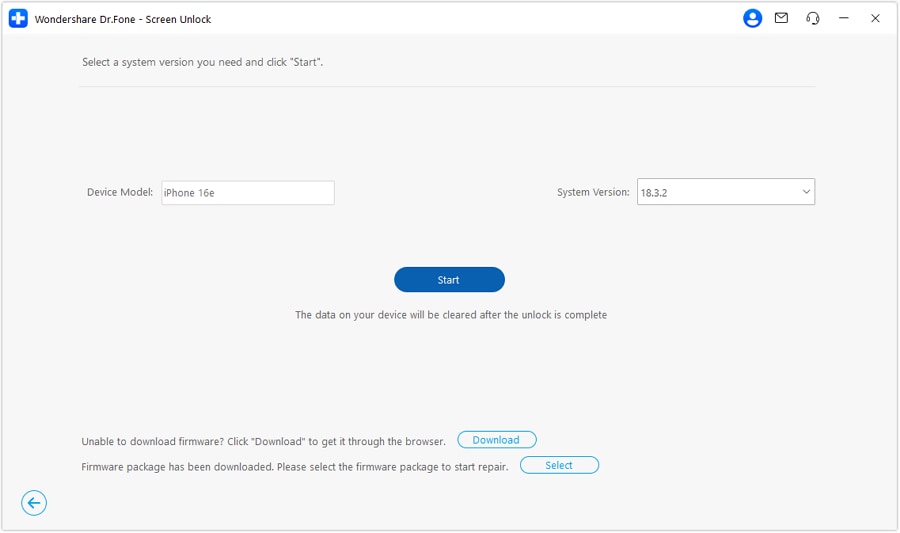
- Step 10: The latest iOS firmware is being downloaded.
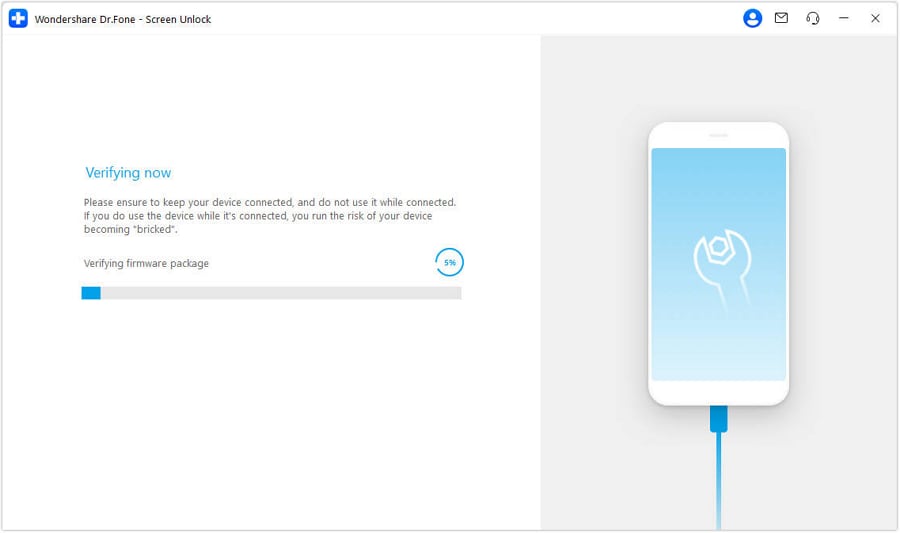
- Step 11: Click Unlock Now to proceed.
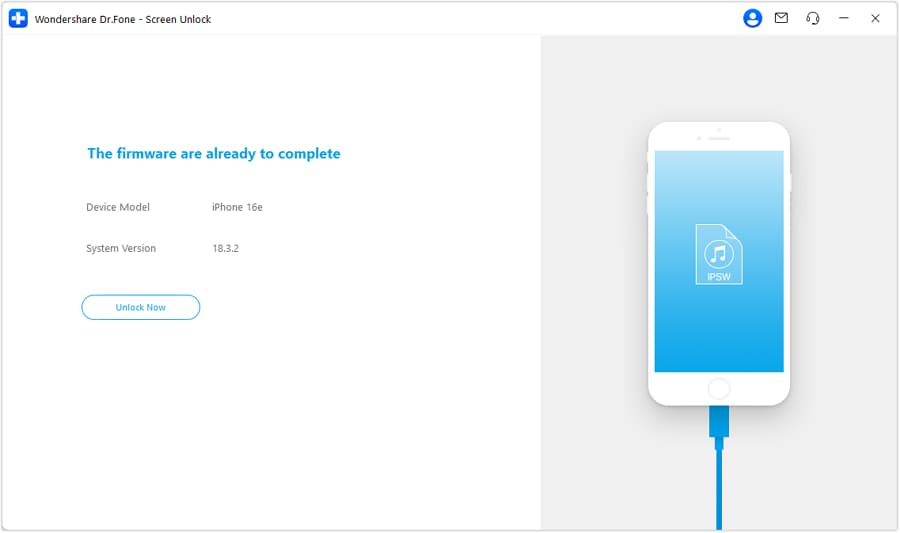
- Step 12: Enter the code given in the dialogue box and click Unlock to continue.
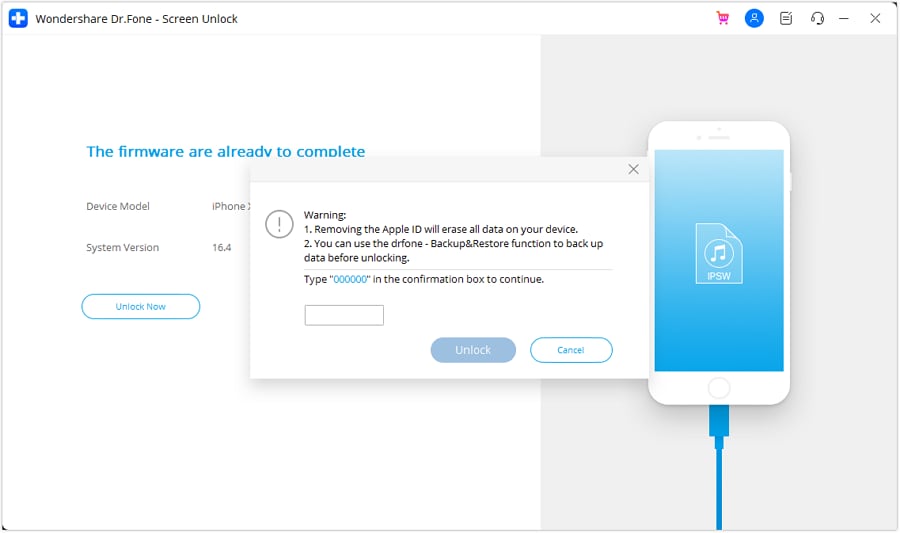
- Step 13: Dr.Fone will then begin removing the iCloud account. Do not disconnect or use your device while the process is ongoing to avoid device issues.
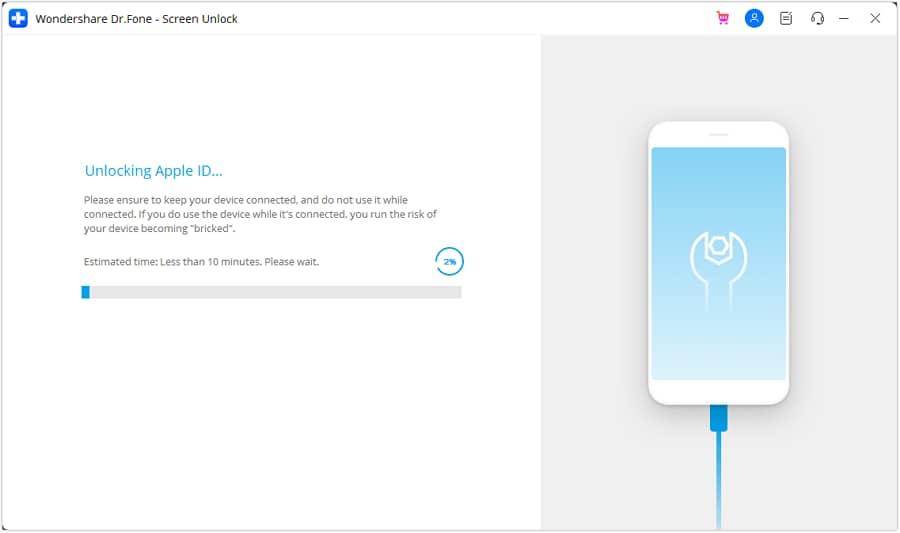
- Step 14: To finalize the Apple ID removal process, please check your device and click Done once you’ve verified it.
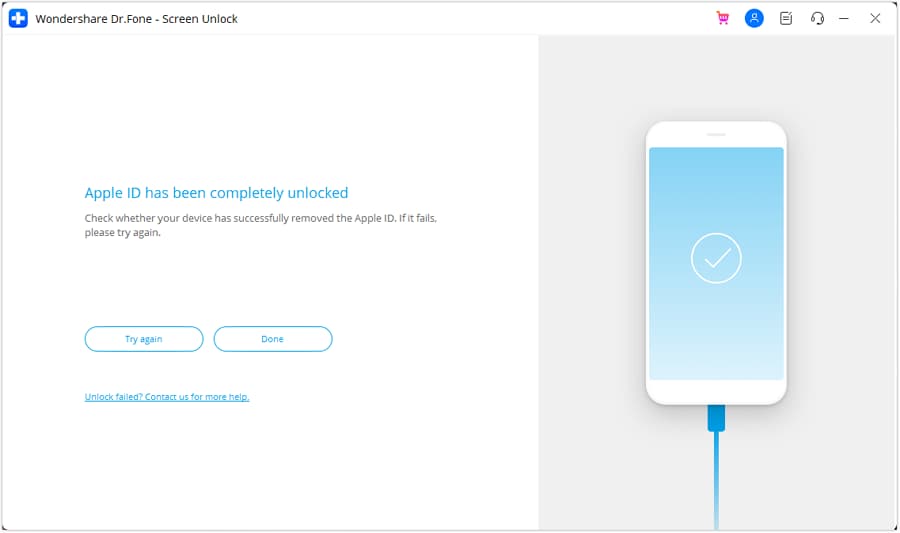
Part 5: How To Remove an iCloud Account Without Deleting an Apple ID Account?
Deciding to permanently “delete iCloud account“ or Apple ID is a significant step. If you’re unsure about this irreversible action, consider deactivating your account. Deactivating your Apple ID temporarily suspends it. However, this feature may depend on your location.
Once you deactivate your Apple ID, you can no longer use it to sign into any Apple services, including iCloud, the App Store, iTunes, Apple Books, FaceTime, and Apple Pay. Even so, deactivating your Apple ID does not delete your account. You can reactivate your account anytime to regain access to all your Apple services and data.
Here’s how to temporarily deactivate your Apple ID account:
- Step 1: Go to Apple’s Data and Privacy website. Sign in using your Apple ID.
- Step 2: Scroll down to the Temporarily deactivate your account section and click Request to deactivate your account.
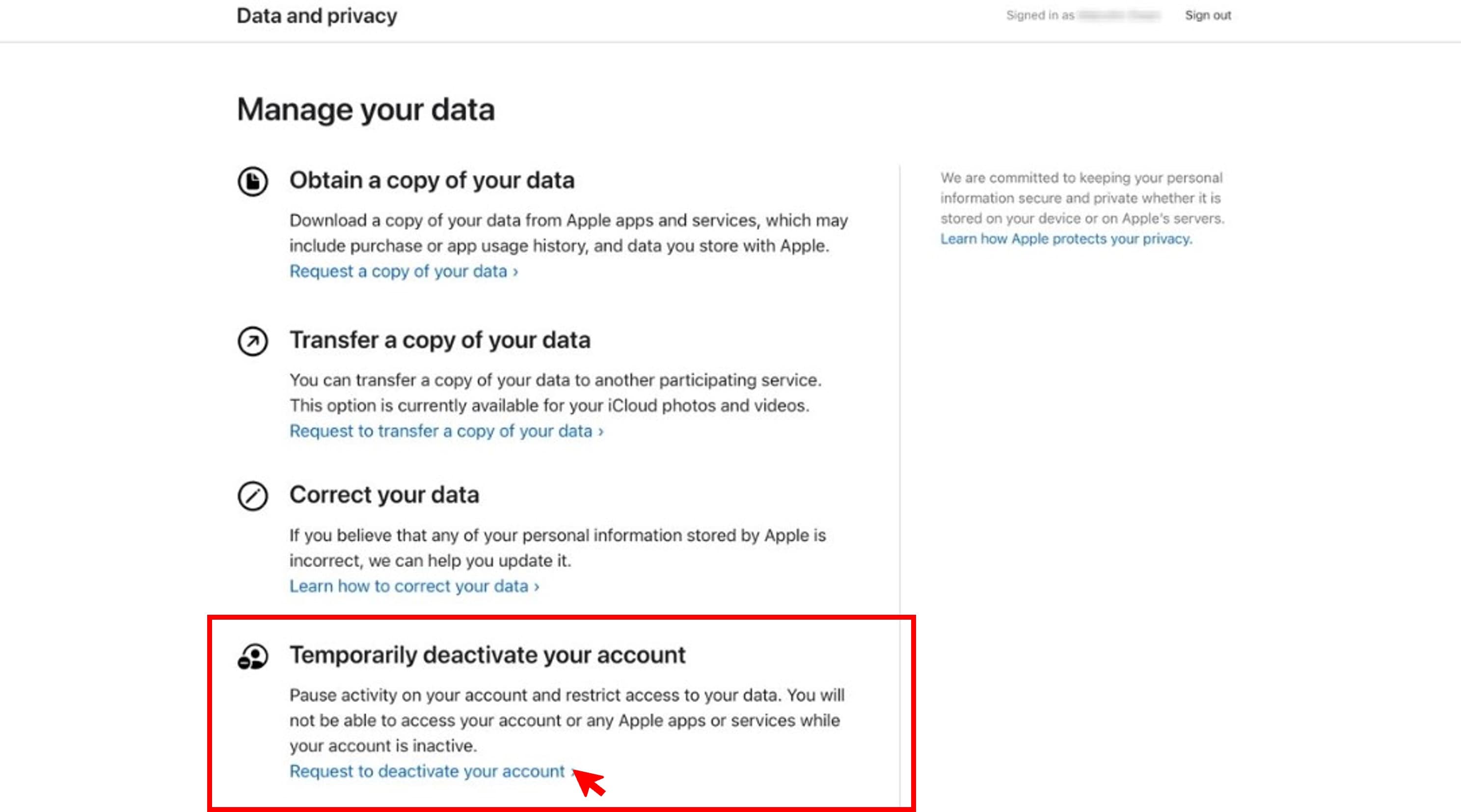
- Step 3: Select a reason for deactivating your account from the drop-down menu, then click Continue.
- Step 4: Review the information and follow the on-screen instructions to complete deactivation.
Note:
Keep the unique alphanumeric access code you’ll receive. You’ll need it to reactivate your Apple ID account.
More Article About iCloud Account:
Ways to Restore from iCloud Backup Without Reset
3 Ways to Recover iCloud Password
iOS 16: Best Ways to Bypass iCloud Activation Lock on iPhone/iPad
Conclusion
As you’ve learned, deleting an iCloud account is a permanent decision you cannot reverse. Once deleted, your account and all associated data will be permanently erased from Apple’s servers. Thus, it’s crucial to back up your data before proceeding.
Apps like Dr.Fone provide a comprehensive solution for backing up your data and removing an iCloud account without a password. Its user-friendly interface and streamlined processes make it an ideal choice for those seeking a quick and hassle-free experience. Whether you’re looking for an answer on “how to delete iCloud account“ or “remove iCloud account,” Dr.Fone is the ultimate tool to guide you through the process.
How to Delete iCloud Account On Apple iPhone SE without Password?
If you own various Apple products, you must be familiar with the significance of iCloud service. iCloud is a cloud storage service that allows Apple users to sync their data and access it across different Apple devices, be it iPhone, iPad, or Macbook.
Now, there are several situations where a user might want to delete their iCloud account, especially when one has created too many iCloud accounts and don’t remember the passwords to all of them.
So, in this guide, we’re going to share some insight into how to delete iCloud account without password so that you can get rid of all the unnecessary accounts and use a single one across all your iDevices.
Part 1: How to delete iCloud account without password on iPhone?
If you have an iPhone at the moment, here are three different ways to delete an iCloud account using your phone itself.
1.1 Remove iCloud from settings on iPhone
Follow these instructions to delete the iCloud account from the “Settings” menu on your Apple iPhone SE.
Step 1: Open “Settings” and scroll down to click on “iCloud”.
Step 2: You’ll be asked to enter your password. Here enter any random number and click “Done”.
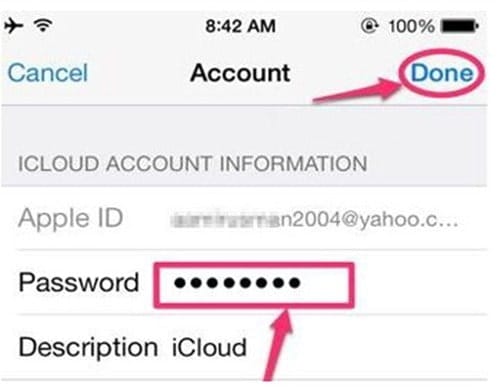
Step 3: iCloud will tell you the password is incorrect. Tap “Ok” and you’ll be prompted back to the iCloud screen.
Step 4: Now, click on “Account” and erase everything from “Description”. Click “Done” and you’ll again go back to the iCloud screen. This will disable the “Find My iPhone” feature and you’ll be able to remove the iCloud account easily.
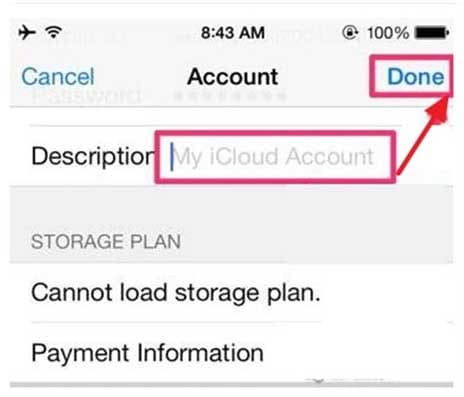
Step 5: Again, tap on iCloud and scroll down till the end. Tap “Delete Account” and again click “Delete” to confirm your action.

That’s how to delete iCloud account without password directly from “Settings” on your Apple iPhone SE.
1.2 Delete iCloud account via iTunes
Another convenient way to delete the iCloud account is to use iTunes on your Apple iPhone SE. Let’s walk you through the process of deleting an iCloud account using iTunes.
Step 1: First of all, make sure to disable the “Find My iPhone” feature. Navigate to “Settings” > “iCloud” > “Find My iPhone” and toggle the switch off to turn off the feature.
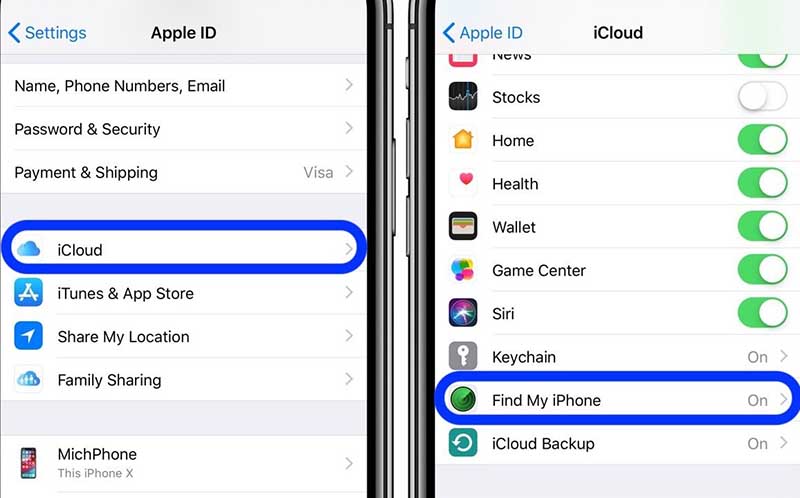
Step 2: Now, go back to the “Settings” window and click “iTunes & App Store”.

Step 3: Tap on your “Account” at the top. A pop-up will appear on your screen. Here, click “Sign Out” and the iCloud account will be removed from your iDevice.
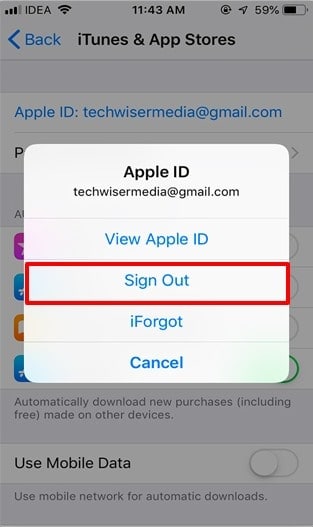
1.3 Create a new password
If you have enabled two-way verification on your Apple iPhone SE, you can also delete the iCloud account by resetting the password. In this case, however, you’ll have to visit the Apple ID Account Page and use it to reset the password.
Here’s how to delete iCloud account without password by creating a new password.
Step 1: Visit the Apple ID Account page and select “Forgot Apple ID or Password”.
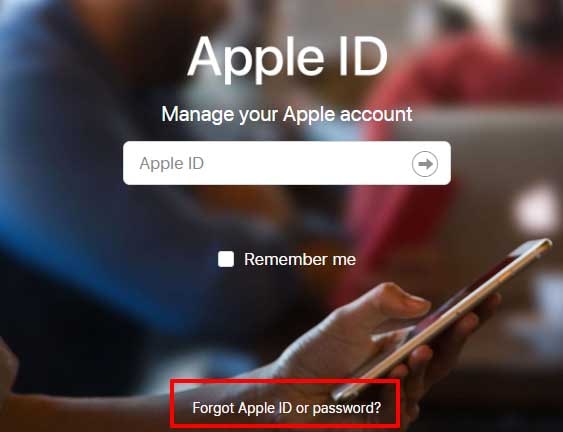
Step 2: Now, enter your Apple ID and tap “Continue”. Select “I Need to Reset My Password” to initiate the password resetting process.
Step 3: You’ll be prompted to a new window where you’ll have to enter the “Recover Key”. This key is an exclusive that’s generated when a user enables two-way verification for their iCloud account.
Step 4: Enter the recovery key and tap “Continue”. Now, select a trusted device where you want to receive the verification code. Enter this verification code to continue with the process.
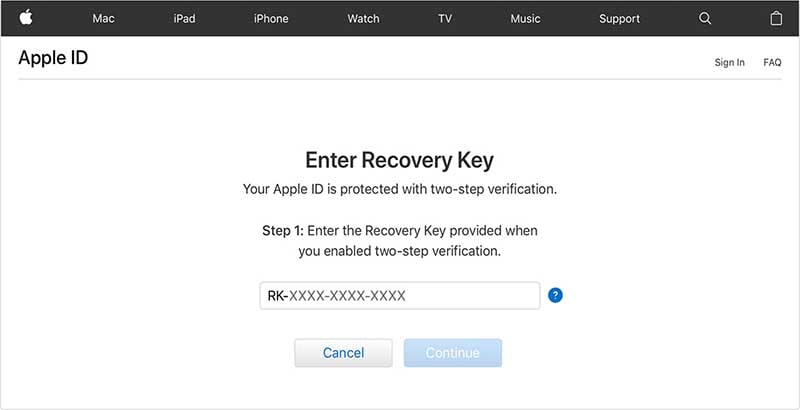
Step 5: In the next window, you can reset the password. Simply, add the new password and click the “Reset Password” button.
Once the password is changed, you can easily delete your iCloud account by going to “Settings” > “iCloud” > “Delete Account”. Enter the new password and your iCloud account will be deleted permanently.
In case you haven’t enabled two-way verification for your iCloud account, there’s still a way to reset the password. However, you must remember the security questions that you answered or the recovery e-mail you had added while setting up your iCloud account.
Step 1: Open the Apple ID Account page and tap “Forgot Apple ID or Password”. Enter your Apple ID and select “I need to reset my password”.
Step 2: You’ll be redirected to a new window displaying two different methods, i.e., “Answer Security Questions” an “Get an Email.” Choose a suitable method and follow the further steps to reset your password.

Part 2: How to delete iCloud account without password on computer using Dr.Fone - Screen Unlock (iOS)?
If you find all the above methods slightly challenging, we have a simpler solution for you. Wondershare Dr.Fone Screen Unlock (iOS) is an exclusive tool for iOS users that’ll help them remove screen locks and delete iCloud accounts from an iDevice, even if you don’t remember the password or even if the “Find My iPhone” feature is enabled.
Thanks to its user-friendly interface, it’ll become a hassle-free task to delete the iCloud account using Dr.Fone Screen Unlock. Since the software is available for Windows as well as Mac, one can easily use it to bypass Apple ID sign-in, irrespective of the OS one’s using on their PC.
So, let’s quickly discuss how to delete iCloud account without password using Dr.Fone Screen Unlock.
Note: Before moving further, make sure to back up the entire data as this will erase everything from your Apple iPhone SE.
Step 1: Launch Dr.Fone Screen Unlock
Install Dr.Fone Screen Unlock on your PC and double-tap its icon to launch the software. Now, connect your iDevice to the computer using a USB cable.
Step 2: Select Screen Unlock
Now, in the main interface of Dr. Fone Screen Unlock, select “Screen Unlock”.

Step 3: Choose the Option
In the next window, you’ll see three different options. Select “Remove Apple ID” as we want to delete the iCloud account.
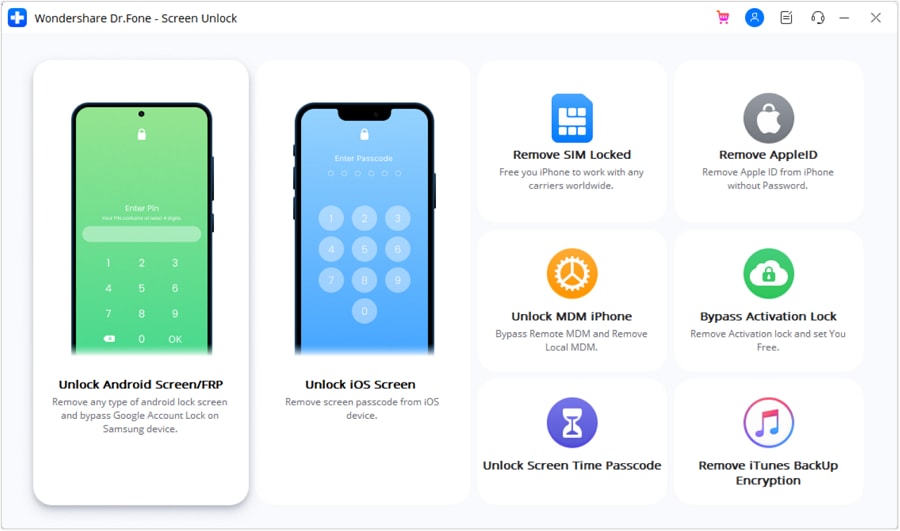
Step 4: Trust the Apple iPhone SE device
Now, to successfully establish the connection between the two devices, enter the passcode on your iDevice and tap the “Trust” button to confirm the connection.
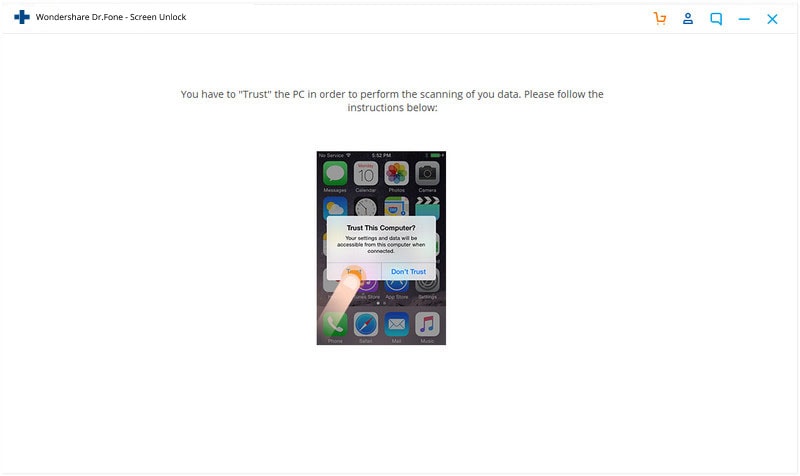
Step 5: Reset Your Apple iPhone SE
Once the two devices are successfully connected, tap “Unlock Now” on your computer screen. This will trigger a warning message. Click “Unlock” to continue with the process.

At this point, you’ll be asked to enter recovery mode. You can follow the on-screen instructions to successfully enter recovery mode.

Step 6: Unlock Apple ID
After entering the recovery mode, Dr.Fone will automatically initiate the unlocking process. Do not disconnect the iDevice from your computer as this can cause damage to the Apple iPhone SE device itself.

As soon as your Apple ID gets unlocked, a confirmation message will pop up on your screen. Simply reboot your smartphone and you’ll be able to sign in with a new Apple ID without any hassle.

It doesn’t matter if you’re using Windows or Mac, Dr.Fone – Screen Unlock for iOS will make it extremely easy to delete the iCloud account without the password. So, if you are looking for a reliable and convenient way to remove an iCloud account, make sure to use Dr.Fone – Screen Unlock.
Conclusion
That’s the entire guide on how to delete iCloud account without password. Even though iCloud is an exceptional feature, one is likely to forget the password to his iCloud account. If you’re stuck in a similar situation and want to create a new iCloud account, make sure to use the above tactics to delete the previous iCloud account, even if you don’t remember the password.
How To Reset the Security Questions of Your Apple ID On Your Apple iPhone SE
Your Apple ID serves as the gateway to a multitude of Apple services, encompassing the likes of the App Store, iCloud, iTunes, and beyond. To fortify the safeguarding of your Apple ID, Apple kindly requests that you establish security questions.
These inquiries act as an extra shield, enabling you to regain access to your account should you ever forget your password. However, there are various reasons to explain why people want Apple ID reset security questions, like discussed below. In this ultimate guide, we provide step-by-step instructions on how to reset the security questions of their Apple ID.
Part 1: What Is the Purpose of the Apple ID Security Questions
Before talking about “reset my security questions Apple ID,” let’s talk about what they are. Apple has a reputation for ensuring the high security of its devices and services. The devices have Face ID and Touch ID for security and strong encryption standards. Apple devices are considered among the most secure in the tech industry. Moreover, Apple takes device security seriously. An example is the use of security questions.
When you create an Apple ID or set up a new device, Apple prompts you to choose security questions. These questions are carefully designed to be something only you would know. This explains their role as an extra layer of protection for your account. Typical instances include questions like “What is the name of your first pet?” or “In which city were you born?”
Importance of Apple ID Security Questions
The security questions associated with your Apple ID serve a critical role. They perform a pivotal role in ensuring the security and confidentiality of your digital presence. Numerous modern authentication techniques, such as biometrics, offer a strong layer of safeguarding.
Nonetheless, there might be instances where you require reentry to your account, such as in cases of forgotten passwords. In such scenarios, security questions serve as a vital lifeline, enabling you to authenticate your identity and regain control of your Apple ID.
Purpose of Security Questions
- Account Recovery: Security questions are a valuable tool for account recovery. They provide a means for you to prove your identity to Apple support in case you’re locked out of your account. Thus helping you regain access to your account quickly.
- Additional Layer of Security: Imagine someone manages to get your Apple ID details. Even then, they would still need to answer your security questions to make changes to your account. This extra layer of account protection prevents unauthorized access.
- Privacy Protection: Apple understands the importance of privacy. By setting up security questions, you can choose information that is meaningful to you. At the same time, it is not easily discoverable by others, enhancing the privacy of your account.
Part 2: How To Reset the Apple ID Security Questions Through the Account Settings
As we’ve established, Apple prioritizes security and privacy. There are various reasons why you might want to reset your Apple ID security questions. These range from enhancing security to changing the info associated with your account. Whatever your reason, it’s essential to securely follow the proper procedure for iCloud reset security questions.
Why Reset Your Apple ID Security Questions?
- Enhancing Security: Security is an ever-evolving field. Resetting your security questions periodically can strengthen your account’s defense. It is especially handy against emerging threats and ensures your information remains secure.
- Prevention of Attacks: Do you suspect unauthorized access or believe your security questions may have been compromised? In this scenario, resetting them immediately can protect your account.
- Adhering to Best Practices: Security experts recommend changing passwords and security questions periodically. Regularly updating your security questions is a cautious security practice.
- Making Relevant Changes: Over time, life circumstances change. You might move to a new location, get a new pet, or have different personal experiences. Updating your security questions to reflect these changes can make them more effective.
Guide for Resetting Apple ID Security Questions Through Account Settings
Resetting your Apple ID security questions through your account settings is a straightforward process that enhances the security of your Apple ID. Follow these detailed steps to reset your security questions:
- Step 1. Begin by visiting and signing into the official Apple ID management page at appleid.apple.com. Then, proceed to the “Sign-In and Security” section for changing the security questions.
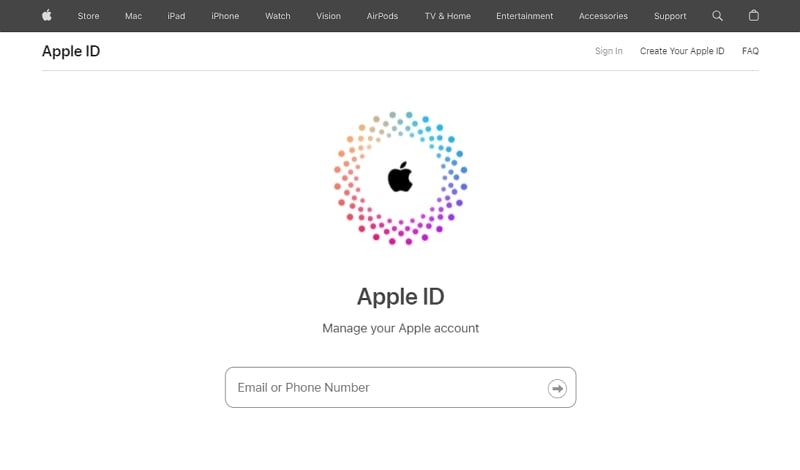
- Step 2. Now, click “Account Security” and follow it by locating “Change security questions.” Click on it to proceed, and you’ll now be prompted to set up new security questions and provide their corresponding answers.
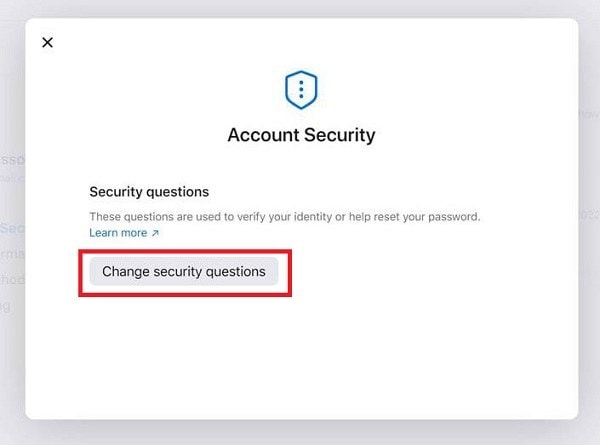
- Step 3. After adding your new security questions and answers, click the “Update” button. To complete the process, you will need to verify your identity by entering your Apple ID password.
Pro Tip: What if Your Apple ID Got Locked? Unlock It With the Best Solution
So, you’ve been following our ultimate guide to reset your Apple ID security questions. However, you hit a roadblock – your Apple ID is locked. It happens many times that people forget their Apple ID passcode or get their Apple ID locked due to various reasons. In such cases, there is no need to panic that you are now unable to unlock the ID and access your important data.
This is because we have an excellent solution that can help you regain access to your Apple ID quickly and efficiently. With the help of the Wondershare Dr.Fone, you can easily get your Apple ID unlocked without a passcode.
Using this tool, users are able to bypass the iCloud activation lock and Apple ID without a password to use it as per their need. Moreover, they can also Bypass MDM and screen time without data loss, which is a plus point of this unique tool.
Key Features of Wondershare Dr.Fone
- This tool is compatible with the latest iPhone 15 models and all iOS versions, including iOS 17.
- No technical skill is required to use this tool because of its easy-to-use interface.
- 6-digit passcode, Touch ID, Face ID, and various screen locks can be removed in no time.
Steps To Unlock Apple ID Without Password via Wondershare Dr.Fone
Following are the simple steps you need to follow to unlock your Apple ID after you have forgotten the passcode:
- Step 1: Initiate the Process by Launching Wondershare Dr.Fone
Begin the unlocking process of Apple ID by installing and launching Dr.Fone’s latest version on your computer. Connect your Apple iPhone SE to the computer and tap on the “Toolbox” option to access different options, from which you need to select “Screen Unlock.”

- Step 2: Tap on Respective Option and Answer Platform Questions
Afterward, hit the “Remove Apple ID” option and tap the “Unlock Now” button in the next window. Proceeding ahead, the platform will ask you some questions which you will need to answer. However, it is necessary to ensure that your Apple iPhone SE has “Screen Lock” and “2FA” enabled.

- Step 3: Enable Recovery Mode and Choose System Version
Then, put your device in Recovery Mode so that the platform can detect the “Device Model.” With this, you will need to choose “System Version” in the respective window and tap on the “Start” button. Required firmware will start downloading that is suitable to your device.

- Step 4: Disable Apple ID on Your Device
On its successful completion, you will be notified from the platform, after which you are required to proceed by clicking on the “Unlock Now” button. A prompt will pop up on the screen; type the code in it and hit “Unlock.” This will remove the Apple ID passcode successfully in just a few moments.

Part 3: How To Perform Apple ID Reset Security Questions Using iForgot Website
Apple offers multiple avenues for users to perform essential security protocol changes, one of which is through the iForgot website. This website serves as a valuable resource for Apple device users in various scenarios. These include forgotten passwords, 2FA issues, account recovery, and unlocking Apple IDs. Here is the process of Apple ID reset security questions using the iForgot website:
- Step 1. Begin by opening your web browser and navigating to the iForgot website at https://iforgot.apple.com/. You will then be asked to input your Apple ID. After entering your Apple ID, proceed by clicking the “Continue” button.
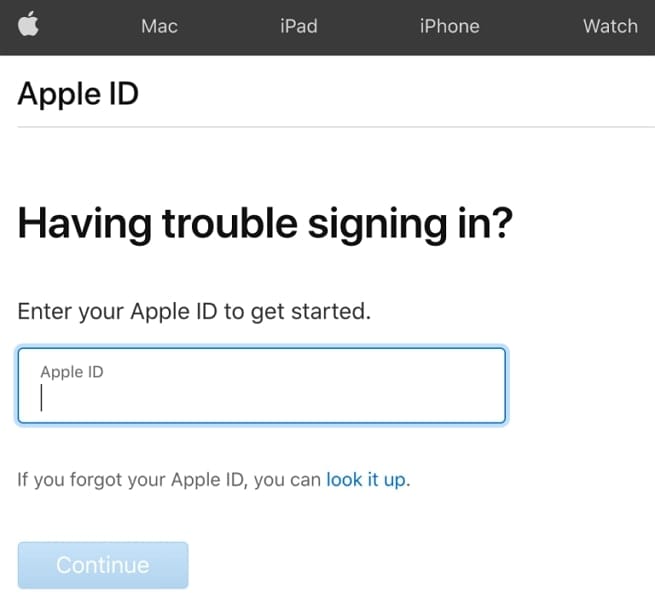
- Step 2. On the following page, you’ll encounter various options for account recovery. Opt for “I need to reset my security questions” and click “Continue.” For added security measures, Apple will request you to confirm your identity.
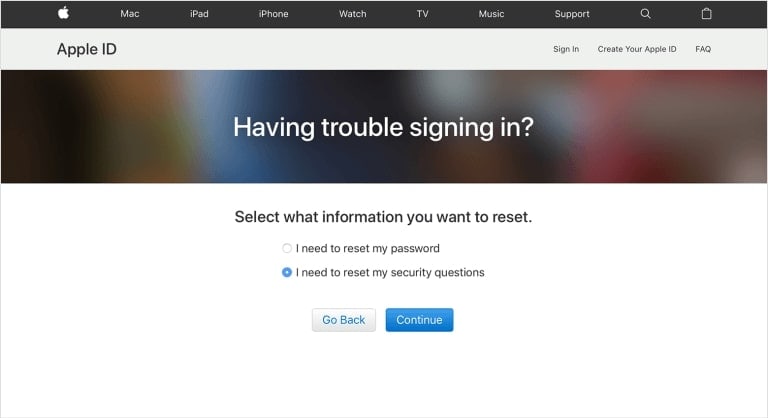
- Step 3. After your identity has been successfully verified, you’ll receive prompts to establish new security questions. Once you’ve created your new security questions, remember to save the changes.
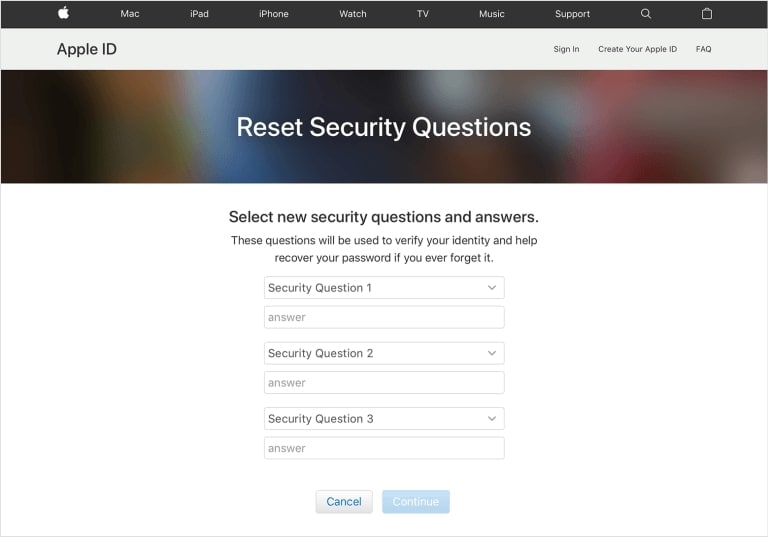
Part 4: How To Reset the Apple ID Questions by Contacting the Customer Support
Contact Apple’s Customer Support if you have failed to reset your Apple ID security questions. They are well-equipped to assist with a wide range of device-related problems. You can use the following guide on how to reset the security questions on Apple ID via Apple Customer Support:
- Step 1: Begin by visiting the Apple Support website located at https://getsupport.apple.com/. Once there, use the search bar to type your issue. In this section, look for and click on “ Change my Apple ID security questions.”
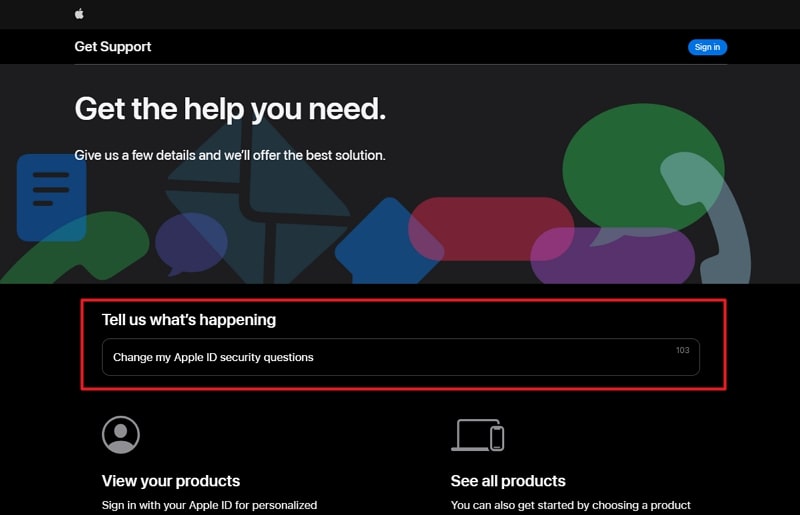
- Step 2: After selecting your issue, you will be presented with various support articles and options. Scroll down and choose the desired option from the “Contact” section. Follow the on-screen instructions to contact Apple support and provide details about your issue.
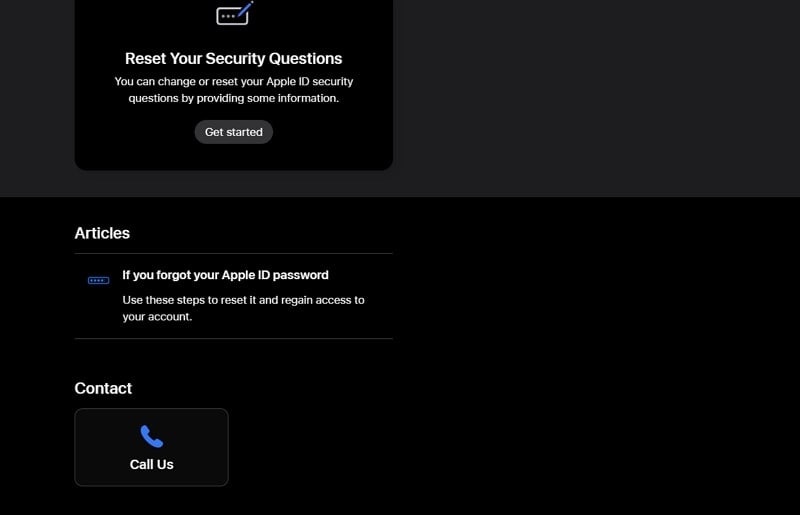
Conclusion
To summarize, we’ve explored the importance of Apple ID security questions. We provided you with different ways on how to reset the security questions on Apple ID. The article highlighted the significance of security in the Apple ecosystem. It also explained the role security questions play in protecting your account.
We discussed the various reasons why you might want to reset your Apple ID security questions. You learned how to reset your security questions through your Apple ID account settings and via the iForgot website. Additionally, we introduced Wondershare Dr.Fone as a reliable solution for unlocking your Apple ID. Dr.Fone offers a user-friendly interface, a high success rate, and the ability to resolve various iOS device issues.
Also read:
- 2024 Approved No More Hidden Shorts, Just Visible Ones
- 2024 Approved Secrets to Effective VR Game Playback
- Can I Remove the Apple Watch Activation Lock By iPhone 12 mini without the Previous Owner?
- How To Unlink Your Apple iPhone 7 Plus From Your Apple ID
- How To Unlink Your iPhone X From Your Apple ID
- In 2024, Guide to Mirror Your OnePlus Nord 3 5G to Other Android devices | Dr.fone
- In 2024, How to Fix when Apple Account Locked From Apple iPhone 12?
- In 2024, iCloud Separation How To Disconnect iPhone 12 and iPad
- In 2024, The Essentials of Creating and Curating Instagram Highlights
- In 2024, Top-Notch Solutions for Disabled Apple ID From Apple iPhone 13 Pro Making It Possible
- In 2024, Ultimate Guide to Catch the Regional-Located Pokemon For Lava Blaze Pro 5G | Dr.fone
- Ten Hilarious Word Puzzles That Break The Ice in Chats
- Troubleshooting Error Connecting to the Apple ID Server On Apple iPhone 15 Plus
- Unbiased Take on RecordCast Efficacy for 2024
- Which Pokémon can Evolve with a Moon Stone For Motorola Moto E13? | Dr.fone
- Will MOV files play on Samsung Galaxy F34 5G ?
- Your Account Has Been Disabled in the App Store and iTunes On iPhone 6s Plus?
- Title: How To Delete iCloud Account Remove Your Apple ID Permanently On Apple iPhone SE
- Author: Alma
- Created at : 2025-02-26 10:20:54
- Updated at : 2025-03-03 21:46:21
- Link: https://apple-account.techidaily.com/how-to-delete-icloud-account-remove-your-apple-id-permanently-on-apple-iphone-se-by-drfone-ios/
- License: This work is licensed under CC BY-NC-SA 4.0.